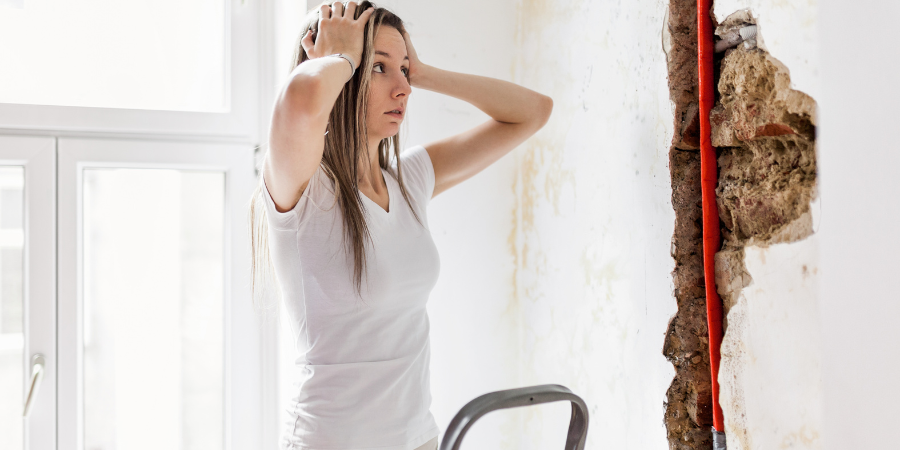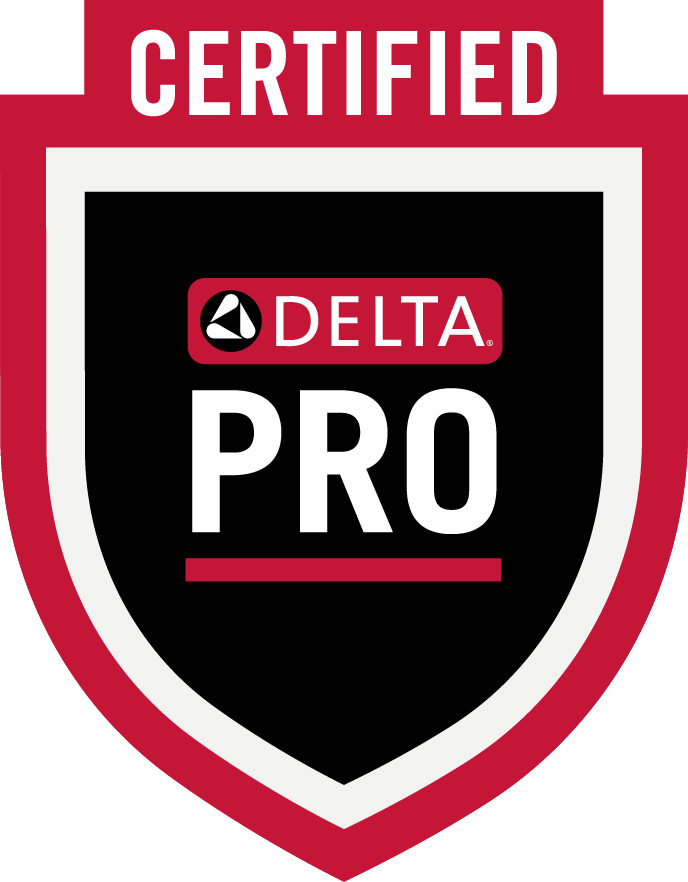Spring has sprung, and with warmer days and fragrant flowers comes an increased chance of a slab leak. In this article, we will learn what a slab leak is and its common causes. Because these leaks are typically hidden from view, we will describe the signs a slab leak may be happening so early diagnosis and repairs can be completed. The sooner a slab leak is detected, the less damage will result, and the less water will be wasted.
What Is A Slab Leak?
Homeowners can experience various types of plumbing leaks, but one type in particular should never be overlooked: a slab leak. A slab leak is a failure in a plumbing system installed in a home built on top of a cement slab.
Many homes were and still are built with concrete foundations. This means there is no crawlspace or basement through which the plumbing pipes can run; instead, they run through and beneath the cement slab. When these plumbing pipes leak, they cause serious structural damage and pose health risks to the home’s inhabitants.
These leaks can occur in the water supply lines embedded in the slab or in sewer pipes that run underneath the ground. Water line leaks are easier to find, whereas sewer leaks can go undetected for many months due to their being buried deep beneath the soil.
Causes Of Slab Leaks
From improper installation to the use of less-than-superior materials, the causes of a slab leak are numerous. Here, we will investigate the most common causes of a leak.
Shifting And Eroding Soil
Every cement slab foundation and plumbing pipe installed underground is supported by the surrounding soil. If, for any reason, this soil moves, it can crack the foundation and cause pipe joints to pull apart and become misaligned. Thus, plumbing running through the slab can crack and leak along with those underground.
Soil can shift from earthquake activity or nearby construction projects, and as the soil shifts, it places undue pressure on pipes. Cracked and leaking pipes further affect the stability of the soil as liquids escape the pipe and erode the soil.
Underground Streams
In areas where homes are built near underground streams, the water can further destroy the support the soil is meant to provide, causing leaking pipes and unstable foundations.
Abrasion
Some pipes become weakened by outside forces, such as the physical makeup of the surrounding soil. Dirt that is laden with rocks and gravel can rub against pipes and wear them out prematurely. The pipes can also come in contact with each other or against the slab itself, reducing their strength and durability.
Weather
Excessively rainy weather, such as spring weather, can also affect plumbing pipes. Soils become overly saturated and expand, adding pressure on pipes and their connections. Then, as the ground dries, the soil contracts and shifts, leading to the issues already discussed. Spring is the season for inconsistent weather conditions!
Water Quality
Water quality plays a role in slab leak frequency. As hard water minerals accumulate inside plumbing pipes, they restrict the flow of water. This corrosive material weakens pipes and causes them to deteriorate quickly.
Soft water, too, can be detrimental, especially in copper piping, where it causes tiny, hard-to-detect pinhole leaks. These insidious leaks are responsible for structural damages and mold growth, a common effect of slab leaks.
Poor Installation
Inferior pipe materials commonly lead to slab leaks since they do not have the durability or long lifespan of top-of-the-line materials. Additionally, insufficient mixing and curing of cement slabs can leave behind weak foundations that will crack under the slightest tension.
High Water Pressure
As water enters a home, it should run at a velocity that is agreeable to plumbing pipes and fixtures. High-pressure water stresses pipe joints and pipe interiors, causing them to leak.
Signs A Slab Leak Is In Progress
Here are some common signs to watch for.
Hot Or Wet Spots On Floors
Slab leaks happen more often in water pipes that carry hot water, so a hot spot on the floor is often a sign a hot water line is leaking. If left unattended, the water eventually will work itself to the surface, leaving a wet spot.
Mold And Mildew
Excess moisture from leaking pipes can cause mold and mildew to grow underneath flooring and carpets. Mold spores become airborne, and breathing them in can lead to asthma, coughing, sneezing, and respiratory issues.
Low Water Pressure
As one can imagine, when a pipe leaks, the pressure within the pipe is reduced. There are other reasons why water pressure may fail, but if water pressure suddenly declines, it may be a sign that a slab leak has occurred.
Sound Of Running Water
A broken water line will produce a running water sound even if there is no call for water. If you hear a splashing or running water sound coming from inside your walls, you need to call for emergency help immediately.
Soggy Lawn
A break in the sewer line outside will release wastewater into the surrounding soil. As it absorbs the water, the ground eventually becomes saturated, and the wastewater begins pooling on the surface. The sight of this waste will pale compared to the foul odors accompanying a sewer leak.
Increased Bills
A final indicator of a possible slab leak will be skyrocketing water and energy bills. Keep an eye out to be sure the increase isn’t a result of excessive water use, such as when replenishing a pool.
Prevention
To protect the integrity of your home’s infrastructure and to keep the inhabitants safe, it is best to place certain safeguards in place. Here, we will look at some steps homeowners can take to protect themselves against slab leaks.
Monitor Water Pressure
The ideal water pressure in a home should be 60 to 80 pounds per square inch (psi). Pressures exceeding 80 psi are considered high and will lead to excess wear and tear on plumbing pipes. Installing a pressure regulator will help maintain the proper water pressure.
Install A Water Softener
A water softener is designed to remove or isolate hard water minerals such as calcium and magnesium from the water and prevent corrosion from occurring. Corrosion is an enemy of pipes and will cause them to deteriorate prematurely.
Avoid Chemical Drain Cleaners
When plumbing pipes become clogged, resist the temptation to use chemical drain cleaners. While they work well to relieve blockages, they ruin the interiors of plumbing pipes and cause them to fail.
Enroll In Preventative Maintenance
Regular inspections provided by qualified professionals will help reduce the frequency of slab leaks and minimize the damages they incur since early detection and repair are needed. Trained professional plumbers are adept at identifying, locating, and repairing slab leaks, but they cannot do so if you do not invite them into your home.
Looking For Slab Leak Repair?
We offer outstanding slab leak repair to our valued customers who rely on us for expertise and experience. Slab leaks are a severe plumbing emergency, and repairs must be made quickly and accurately, or the potential damage can become costly and overwhelming.
When you want the job done right the first time, we are the plumbers you can trust and rely on. Your safety and the safety of your home are our #1 priority. Call today to schedule an appointment!






